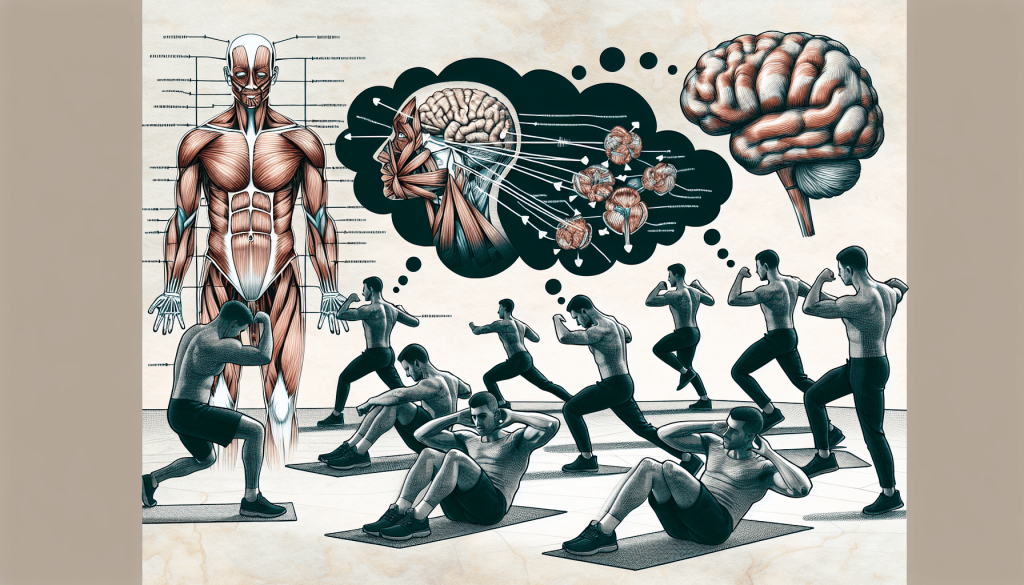Whether you’re aiming to sculpt six pack abs or strengthen your core muscles, the mind-muscle connection plays a vital role in your abdominal workouts. It’s a concept that often raises questions in the fitness world, making you wonder just how important it truly is. The mind-muscle connection refers to the conscious effort of focusing your mind on the specific muscle groups you are targeting during your workout. By establishing this connection, you can maximize the effectiveness of your abdominal exercises and achieve better results. In this article, we will explore the significance of the mind-muscle connection in abdominal workouts and provide insights into why it matters when it comes to developing a strong and defined midsection.
Understanding the Mind-Muscle Connection
What is the mind-muscle connection?
The mind-muscle connection refers to the ability to consciously engage and activate specific muscles during workouts. It involves focusing your attention on the targeted muscle groups and being fully present in each movement. By establishing a strong mind-muscle connection, you can maximize the effectiveness of your workouts and achieve better results.
How does it work?
The mind-muscle connection is based on the principle of neuromuscular control. When you consciously think about activating a specific muscle, your brain sends signals to the muscle fibers, enabling them to contract more effectively. This focused intention allows you to recruit a greater number of muscle fibers and generate more force during exercises. Ultimately, it enhances the efficiency and effectiveness of your abdominal workouts.
Why is it important in abdominal workouts?
The mind-muscle connection plays a crucial role in abdominal workouts for several reasons. First, the abdominal muscles are deep and hard to access, making it challenging to engage them fully without a strong mind-muscle connection. Second, developing a deep connection with your abs can help prevent compensatory movements and ensure that the targeted muscles are doing the majority of the work. Lastly, by harnessing the power of the mind-muscle connection, you can optimize muscle activation, recruitment, and coordination to achieve better results in your abdominal training.
Benefits of Mind-Muscle Connection in Abdominal Workouts
Enhanced muscle activation
When you establish a strong mind-muscle connection, you activate a larger number of muscle fibers within the targeted muscle group. This increased muscle activation leads to greater strength development, improved endurance, and enhanced muscle hypertrophy. By consciously engaging your abdominal muscles, you can make each repetition count and extract the most benefit from your workouts.
Improved muscle recruitment
Building a strong mind-muscle connection allows you to recruit the right muscles for the desired movement. It helps prevent compensatory patterns and ensures that the targeted muscles are effectively engaged. By avoiding the recruitment of unrelated muscle groups, you can focus solely on strengthening and toning your abs, leading to more efficient and effective abdominal workouts.
Greater mind-body coordination
The mind-muscle connection enhances your overall mind-body coordination, enabling you to perform exercises with better control, balance, and precision. By honing your ability to consciously activate specific muscles, you develop a deeper awareness of your body’s movement patterns and limits. This heightened coordination translates into improved stability during abdominal workouts, reducing the risk of injuries and allowing you to perform exercises with proper form and technique.
Increased workout effectiveness
By harnessing the power of the mind-muscle connection, you can significantly increase the effectiveness of your abdominal workouts. The ability to deliberately engage and contract your abdominal muscles enables you to perform exercises more efficiently, resulting in a more intense training stimulus. This increased workout effectiveness ultimately leads to better progress, faster muscle development, and a stronger core.

Exercises to Strengthen the Mind-Muscle Connection in Abdominal Workouts
Isometric exercises
Isometric exercises involve holding a static position without joint movement, effectively isolating and engaging specific muscles. Planks and static abdominal exercises are excellent choices for strengthening the mind-muscle connection. By focusing on contracting your abdominal muscles and maintaining proper form throughout the exercise, you can enhance your awareness and connection with your core.
Slow and controlled movements
Performing abdominal exercises with slow and controlled movements allows you to maximize the mind-muscle connection. Instead of rushing through the motions, concentrate on consciously engaging your abs and feeling the muscle contractions throughout each rep. Slow and controlled movements also help minimize the involvement of secondary muscles, ensuring that your abdominal muscles bear the primary load.
Concentration on muscle contractions
During your abdominal workouts, consciously focus on feeling the contractions of your abs. Pay attention to the sensation of the muscles tightening and releasing with each repetition. By mentally connecting with your muscles, you can improve your ability to isolate and engage the abdominal muscles effectively.
Visualizing the muscles working
Visualization is a powerful tool that can aid in strengthening the mind-muscle connection. Before and during your abdominal workouts, visualize your abs contracting and working hard. By mentally connecting with your muscles and creating a vivid image of them in action, you can further enhance the mind-muscle connection and optimize your workout performance.
Experts’ Opinions on the Significance of the Mind-Muscle Connection
Insights from fitness trainers
Fitness trainers emphasize the importance of the mind-muscle connection in abdominal workouts. They emphasize the need to be fully present, engaged, and focused on every repetition. By developing a strong mind-muscle connection, trainers believe that individuals can achieve better results and reduce the risk of injuries.
Scientific studies on the topic
Numerous scientific studies have examined the impact of the mind-muscle connection on muscle activation and performance. Research has shown that individuals who establish a strong mind-muscle connection experience greater muscle activation and recruitment, leading to improved strength gains, muscular endurance, and overall training outcomes.
Notable athletes’ experiences
Notable athletes across various sports have acknowledged the importance of the mind-muscle connection in their training routines. They credit their success to the ability to consciously engage specific muscle groups, maximizing their physical potential. These athletes emphasize the need for mental focus and a deep mind-body connection to achieve superior athletic performance.

Common Mistakes That Affect the Mind-Muscle Connection in Abdominal Workouts
Lack of focus and distraction
One common mistake that hinders the mind-muscle connection is a lack of focus and distraction during workouts. When your mind is wandering or preoccupied with other thoughts, it becomes challenging to fully engage and activate specific muscle groups. To enhance the mind-muscle connection, eliminate distractions and focus on being present in each repetition.
Using excessive momentum
Another mistake that affects the mind-muscle connection is relying on excessive momentum during abdominal exercises. Swinging or using momentum to complete the movements reduces the tension on the abdominal muscles, leading to diminished muscle activation. To optimize the mind-muscle connection, prioritize controlled movements and avoid relying on momentum to perform the exercises.
Neglecting proper form and technique
Neglecting proper form and technique can also impede the mind-muscle connection. When your alignment is compromised or you perform exercises with incorrect postures, it becomes challenging to engage the intended muscle groups effectively. To improve the mind-muscle connection, focus on maintaining proper form throughout your workouts and prioritize quality over quantity.
Tips to Improve the Mind-Muscle Connection
Developing body awareness through meditation and mindfulness
Practicing meditation and mindfulness exercises can help improve body awareness and deepen the mind-muscle connection. By engaging in mindful practices, you become more attuned to your body’s sensations, allowing you to better connect with and activate specific muscle groups during abdominal workouts.
Engaging in specific exercises for mind-muscle connection
Incorporating exercises specifically designed to strengthen the mind-muscle connection can be highly beneficial. Exercises such as pelvic tilts, supine leg slides, or cat-cow stretches focus on engaging and isolating the abdominal muscles. By regularly including these exercises in your routine, you can enhance the mind-muscle connection and improve your overall abdominal training outcomes.
Utilizing biofeedback devices and tools
Biofeedback devices and tools, such as electromyography (EMG) sensors and muscle contraction monitors, can provide real-time feedback on muscle activation during workouts. By utilizing these tools, you can visually observe and track the intensity of your muscle contractions, helping you strengthen the mind-muscle connection and optimize your training efficiency.
Progressive overload and gradual muscle activation
To improve the mind-muscle connection, gradually increase the intensity and difficulty of your abdominal workouts. Gradually adding resistance or progressing to more challenging exercises helps activate a greater number of muscle fibers, strengthening the mind-muscle connection. Progressive overload fosters a deeper connection with your muscles, leading to improved performance and results.

Utilizing the Mind-Muscle Connection for Different Abdominal Exercises
Crunches and sit-ups
When performing crunches and sit-ups, focus on consciously engaging your abdominal muscles throughout each repetition. Visualize your abs contracting and intensify the muscle activation as you lift your torso off the ground. By strengthening the mind-muscle connection, you can enhance the effectiveness of these classic abdominal exercises.
Planks and variations
During planks and their variations, concentrate on maintaining a strong mind-muscle connection with your entire core. Visualize your abdominal muscles working hard to stabilize your body, and engage your core with each breath. By consciously activating your abs and focusing on the mind-muscle connection, you can optimize the benefits of plank exercises.
Russian twists
When performing Russian twists, focus on twisting from the waist while actively contracting your abdominal muscles. Concentrate on the mind-muscle connection as you rotate your torso, feeling the obliques working. By engaging your abs and visualizing the muscles in action, you can maximize the effectiveness of Russian twists.
Leg raises
While performing leg raises, concentrate on engaging your lower abdominal muscles. Visualize your abs working hard to lift your legs while maintaining a controlled motion. By establishing a strong mind-muscle connection and focusing on the lower abs, you can better target and strengthen these hard-to-reach muscles.
Ab wheel rollouts
During ab wheel rollouts, engage your entire core and actively contract your abdominal muscles as you extend and roll out. Focus on maintaining proper form and technique, keeping your abs fully engaged throughout the movement. By strengthening the mind-muscle connection, you can effectively challenge your core and improve your abdominal workout.
Mind-Muscle Connection in Abdominal Recovery and Injury Prevention
Reducing excessive strain on the lower back
A strong mind-muscle connection plays a crucial role in reducing excessive strain on the lower back during abdominal workouts. By consciously engaging and activating the abdominal muscles, you can effectively stabilize the spine, reducing the load on the lower back and minimizing the risk of injuries.
Engaging the deep core muscles
The mind-muscle connection is essential in engaging the deep core muscles, such as the transverse abdominis and multifidus. These muscles provide crucial support and stability to the spine and pelvis. By establishing a strong mind-muscle connection, you can effectively engage these deep core muscles and enhance your overall abdominal recovery and injury prevention.
Maintaining proper alignment and posture
The mind-muscle connection helps you maintain proper alignment and posture during abdominal workouts. By being fully present and focused, you can ensure that your body is properly aligned, reducing the risk of strain or injury. By establishing a strong mind-muscle connection, you can optimize your abdominal workouts and maintain a safe and injury-free training routine.

Combining Mind-Muscle Connection with Nutrition and Overall Fitness
Importance of a balanced diet for muscle development
To complement the mind-muscle connection in abdominal workouts, it is crucial to maintain a balanced diet. Proper nutrition plays a vital role in muscle development, allowing you to fuel your body and support muscle growth and recovery. A diet rich in lean proteins, healthy fats, and complex carbohydrates can optimize the effectiveness of your abdominal training and maximize your results.
Incorporating cardiovascular exercises for overall fitness
In addition to abdominal workouts, incorporating cardiovascular exercises into your fitness routine is vital for overall fitness. Cardiovascular exercises, such as running, cycling, or swimming, promote cardiovascular health, boost endurance, and contribute to overall fat loss. By combining these exercises with targeted abdominal training, you can enhance your overall fitness and achieve a well-rounded physique.
Creating a holistic approach to abdominal workouts
A holistic approach to abdominal workouts involves considering other aspects of your fitness routine and lifestyle. In addition to the mind-muscle connection, nutrition, and cardiovascular exercises, factors such as adequate rest and recovery, stress management, and overall strength training contribute to a comprehensive training program. By adopting a holistic approach, you can optimize the effectiveness of your abdominal workouts and achieve your fitness goals more efficiently.
Conclusion
The mind-muscle connection is a powerful tool that can significantly enhance your abdominal workouts. By consciously engaging and activating specific muscle groups, you can optimize muscle activation, recruitment, and coordination, leading to greater strength, endurance, and overall fitness. Incorporating exercises that prioritize the mind-muscle connection, avoiding common mistakes, and utilizing expert advice and scientific research can help you achieve the best results in your abdominal training. By creating a strong mind-muscle connection, you can transform your abdominal workouts and unlock your full physical potential.






